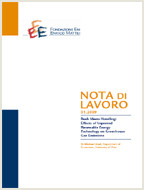Green Technology and Optimal Emissions Taxation

27.06.2014
Stuart McDonald, Joanna Poyago-Theotoky
H23, L11, Q55
Environmental R&D, Green Technology, R&D Spillover, Emissions Tax
Climate Change and Sustainable Development
Carlo Carraro
We examine the impact of an optimal emissions tax on research and development of emission reducing green technology (E-R&D) in the presence of R&D spillovers. We show that the size and effectiveness of the optimal emissions tax depends on the type of the R&D spillover: input or output spillover. In the case of R&D input spillovers (where only knowledge spillovers are accounted for), the optimal emissions tax required to stimulate R&D is always higher than when there is an R&D output spillover (where abatement and knowledge spillovers exist simultaneously). We also find that optimal emissions taxation and cooperative R&D complement each other when R&D spillovers are small, leading to lower emissions.
***
Suggested citation: McDonald, S.,J. Poyago-Theotoky, (2014), ‘Green Technology and Optimal Emissions Taxation’, Nota di Lavoro 59.2014, Milan, Italy: Fondazione Eni Enrico Mattei.
